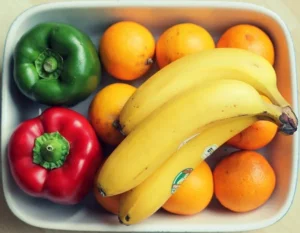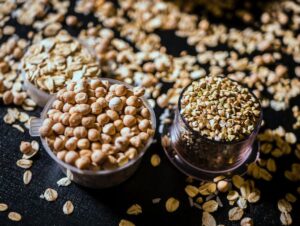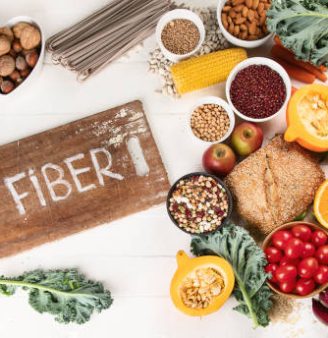
Did you know that one in 10 women of childbearing age experience symptoms of PCOS? PCOS is a common health condition affecting a woman’s reproductive system that can lead to other health challenges such as infertility, diabetes, heart problems, and an increased risk of endometrial cancer.
Symptoms of PCOS can include oily skin, significant weight gain, hair loss, irregular menstrual cycles, and mood imbalance.
If you suspect you may be displaying symptoms of PCOS, talk to your healthcare provider sooner rather than later, especially if you’re having fertility challenges.
We all know that diet and nutrition play a critical role in our health, and for women with PCOS, the food you consume can have a direct impact on their hormone production, specifically insulin levels. Therefore, following a specific diet can help alleviate PCOS symptoms at a hormonal level.
Research has shown that women who follow a specific diet, alongside receiving proper medical treatment, have seen a reduced impact of PCOS symptoms. That being said, paying attention to what you’re putting on your plate and adapting your diet around PCOS could help alleviate some of your symptoms.
Many women who turn to nutrition to help with their PCOS benefit from a diet that is high in protein and low in carbohydrates. When considering what foods to consume when trying to manage PCOS, it’s important to consider all aspects of your diet from breakfast to dinner, including snacks. You want to make sure that you’re eating a balanced diet that still has plenty of variation, which can help to make healthy eating easier to commit to.
Best Foods to Eat with PCOS
1. High Fiber Foods
Studies have shown that getting at least 28 grams of both soluble and insoluble fiber a day can help to improve your body’s reactions to insulin, a significantly impacted hormone in those affected with PCOS.
You can accomplish getting your fill of fiber by incorporating a mixture of fruits, vegetables, whole grains, and high-fiber snacks such as popcorn into your diet. To make sure that you’re getting enough of the good stuff, research the foods you eat, and pay attention to nutrition labels!

2. Fruits and Vegetables
Fresh fruits and vegetables are full of nutrition, fiber, and anti-inflammatory properties. Many of those who suffer from PCOS have chronic inflammation which is linked to several complications such as obesity and type 2 diabetes.
So in addition to getting plenty of fruits and vegetables in your diet, food such as red berries, grapes, apples, and dark leafy green can help to combat inflammation and regulate insulin levels.

3. Whole Grains
Whole grains, which are considered to be “slow carbs,” have a low glycemic index that won’t spike your glucose or insulin levels, which can otherwise aggravate PCOS symptoms. Some examples of good whole grains women with PCOS should consider including in their diet include 100% whole wheat products, barley, brown rice, oatmeal, quinoa, and low-fat popcorn.

4. Lean Protein
A common symptom of PCOS is difficulty in managing one’s weight. Opting for leaner meat that is less calorie dense and contains less saturated fat is essential for women with PCOS as it has a direct impact on weight management.
Lean protein is essential for maintaining a healthy weight, so women with PCOS must get plenty of chicken, turkey, tofu, seeds, beans, and nuts in their diet.

5. Fatty fish
It’s recommended that women with PCOS eat fish rich in omega-3 fats at least twice a week. Omega-3 fats are considered to be anti-inflammatory which can help to combat the chronic inflammation that comes along with PCOS.
If you’re not keen on eating fish, you can mix a tablespoon of ground flaxseed into your yogurt, or in your smoothie. Flaxseed is a great, plant-based way to get your fix of omega-3 fats.

Foods to Avoid with PCOS
1. Sugar
Mixing sugar and PCOS is like mixing oil and fire, you probably want to keep them as far away from each other as possible. This is because consuming sugar when you have PCOS can significantly disrupt your ability to regulate insulin levels, which can in turn cause inflammation.

2. Carbs
When you consume carbohydrates, they get digested into glucose, which is needed to provide your body energy to maintain a healthy metabolism. When PCOS is thrown into the mix, things can get complicated with carbs.
If somebody with PCOS consumes carbs with a high glycemic index, insulin levels can become disrupted, which can then aggravate PCOS symptoms.

3. Processed foods
Very often, processed food is ridiculously high in sugar and carbs, two components that can significantly disrupt insulin levels and aggravate PCOS. In addition to being loaded with carbs and sugar, they are also likely to contain vegetable oils, dairy, gluten, and additives that can contribute to the inflammation caused by PCOS

4. Alcohol
One of the worst things to consume while suffering from PCOS would be alcohol. It’s an unnecessary part of anybody’s diet, and even consuming it on rare occasions has been associated with higher rates of liver disease, especially for women with PCOS. Alcohol consumption with PCOS has the potential to disrupt estrogen levels, reduce your quality of sleep, as well as reduce self-control, which can lead to indulging in cravings that may aggravate PCOS symptoms.

Conclusion
Like with most medical conditions, every case of PCOS is different and depends on the person. Choosing to make lifestyle changes, such as creating a diet adapted around your PCOS has the potential to help alleviate some of your symptoms.
While diet is important for those with PCOS, it’s still crucial that you speak to a trusted healthcare provider about the symptoms you are experiencing to offer expert advice and a treatment plan.








